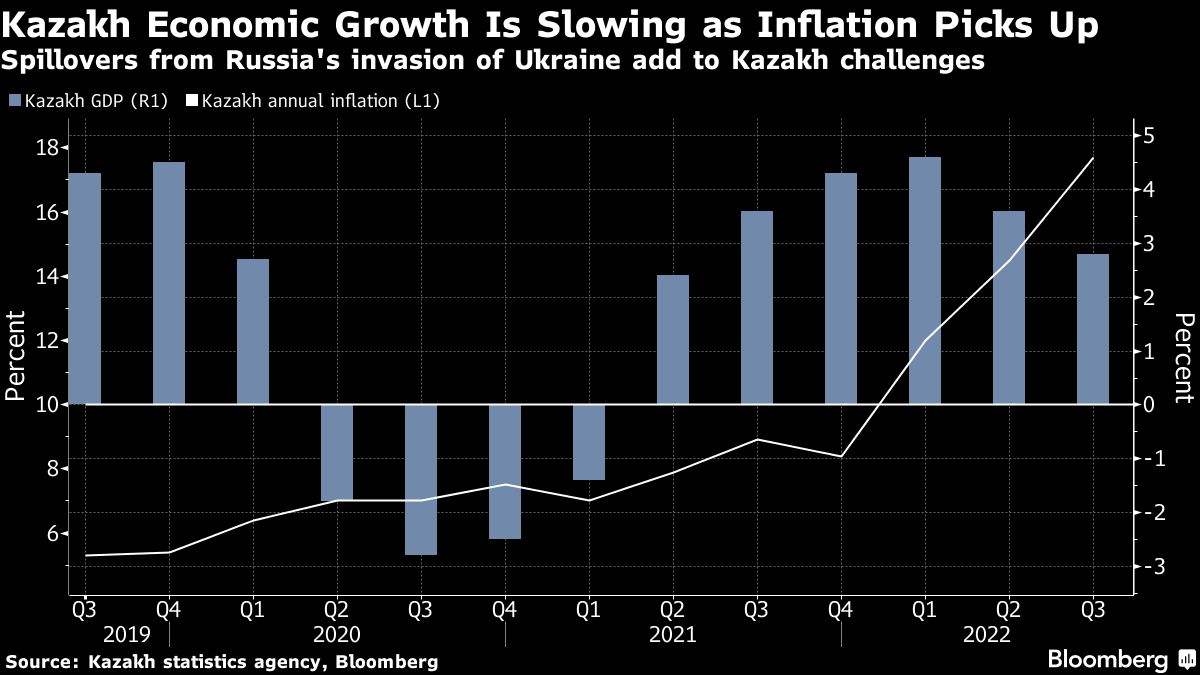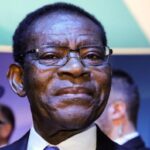
(Bloomberg) — Kazakhs are voting in a presidential election that will cap months of political high drama for incumbent Kassym-Jomart Tokayev, in a year that started with violent protests he called a coup attempt and included his open defiance of Vladimir Putin over the war in Ukraine.
Most Read from Bloomberg
“It’s necessary to continue political reforms,” Tokayev was quoted as saying by state-run newswire Kazinform after he cast his vote on Sunday.
Polling stations started to open at 6 a.m. Sunday and will close at 8 p.m. local time. Official turnout reached 23.4% at 10:05 a.m. Exit polls are due after midnight.
The stakes are high for Tokayev, 69, even if the outcome of the ballot itself is a foregone conclusion, with little in the way of campaigning or debates. His five obscure rivals have avoided criticism of the incumbent, the hand-picked successor of Kazakhstan’s first and only other president, Nursultan Nazarbayev.
“The elections are more of a coronation than free and fair elections,” said Kate Mallinson, founder of Prism Political Risk Management in London.
Tokayev, a career diplomat turned politician, wants to draw a line under a period that saw the most serious challenge to the Central Asian country’s leadership since independence in 1991.
After being handed power by Nazarbayev in 2019, he’s seized on a chance to secure a fresh mandate in the face of building risks for the $200 billion economy of the world’s largest uranium miner as inflation approaches levels last seen more than a decade ago.
Economic challenges have remained high on the agenda since opposition to increases in fuel prices in January spiraled into riots that killed at least 230 people and left hundreds injured after Tokayev ordered security forces to shoot the protesters.
To address some of the grievances, Tokayev has announced increases in the minimum wage and pension payments, among other measures.
“This year’s early election is important insofar as, first, it will legitimize Tokayev as a fully autonomous leader who no longer depends on Nazarbayev for anything,” said George Voloshin, a Paris-based analyst at ACAMS, an anti-financial crime body. And “it will give an extra seven years to leave his imprint on Kazakh politics and eventually carry out overdue political and economic reforms.”
In June, Tokayev amended the constitution by extending the presidential term from five to seven years while limiting the head of state to a single period in office. Alongside the snap ballot this week, Kazakhstan’s parliamentary elections — originally scheduled for 2025 — are now expected early next year.
S&P Global Ratings has said that “there is no credible political opposition party” in Kazakhstan, while “limitations on independent media outlets are significant and perceived corruption is high.”
Russia, Ukraine
The deadly riots, crushed with the help of troops sent by Putin, were a turning point on the way to a crackdown against a system built by Tokayev’s predecessor that’s taken the blame for entrenched corruption in the energy-rich country the size of western Europe.
Another shock followed just weeks after the unrest died down. Russia, Kazakhstan’s biggest trading partner, invaded Ukraine — an economic jolt that also greatly complicated the political calculus for Tokayev.
Kazakhstan, with a large population of ethnic Russians, had to tread carefully since the two countries share the world’s second-longest frontier after the US-Canada border. It’s additionally vulnerable to potential disruptions to a pipeline linked to the Russian port of Novorossiysk that transports about 80% of Kazakh oil exports.
But Tokayev hasn’t backed Putin in return for his help last winter, refusing to side with Russia over the invasion. In June, during a high-profile appearance at an investment forum in St. Petersburg and with the Russian leader seated beside him, the Kazakh president bluntly rejected the idea of recognizing Kremlin-backed eastern Ukrainian territories.
‘Keep Distance’
“While Nazarbayev had close relations with Putin, Tokayev has been keen to keep a distance, especially after Russia’s invasion of Ukraine, which Tokayev sees as a potential threat to Kazakhstan’s own sovereignty,” said Chris Tooke, director of political risk at J.S. Held, a global consulting firm.
In dismantling the legacy of Nazarbayev, who held power for three decades, Tokayev first ousted him as head of the powerful security council and then sidelined his key allies following the unrest.
The president has urged structural reforms and took on vested interests by targeting assets linked to the former ruler’s family and with arrests that ensnared a former prime minister and Nazarbayev’s nephew. Tokayev has also barred close relatives of the president from taking posts in government and state-run companies.
In September, as Tokayev announced the early elections, he reversed one of his first acts to rename the Kazakh capital in Nazarbayev’s honor and returned its former name, Astana.
Same Old?
It’s less clear for critics whether Tokayev represents a clean break with the past or if his efforts amount largely to a power grab and redistribution of wealth. There’s still little transparency over some of the deals involving Kazakhstan state assets.
A Singaporean trust — a corporate structure that shields the identity of its ultimate investors and beneficiaries — used holding firms to buy a commercial and residential property manager, AO Estate Management Co., with about $160 million in assets from a state-run fund in August, according to filings in Kazakhstan and Singapore registries.
The presidential office didn’t reply to a request for comment.
“Following the elections, Tokayev is likely to build a system of new patron-client relations,” Mallinson said. “Initial signs suggest that rather than changing the political economy for the benefit of the Kazakh people, it will be business as usual, with a mixture of some old faces, and some new, controlling the economy.”
Most Read from Bloomberg Businessweek
©2022 Bloomberg L.P.




